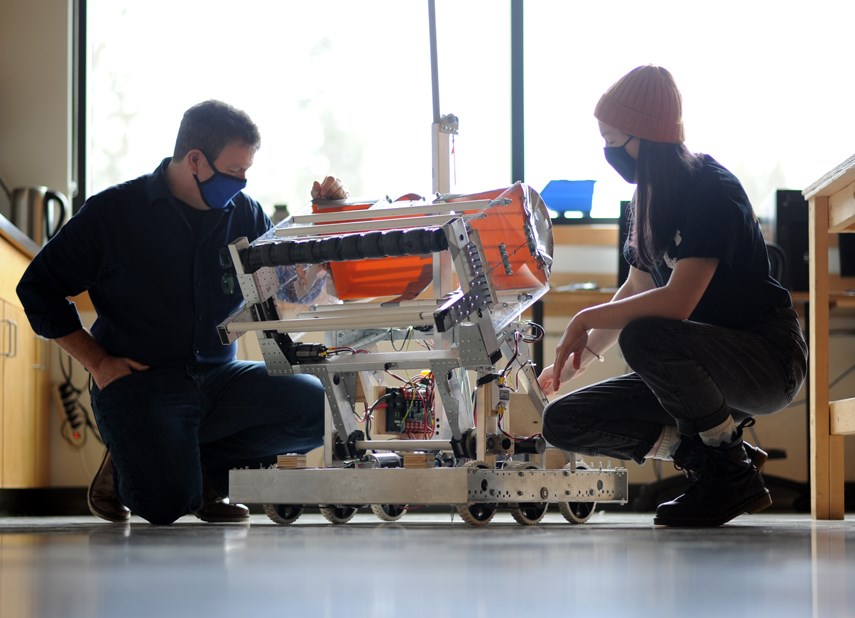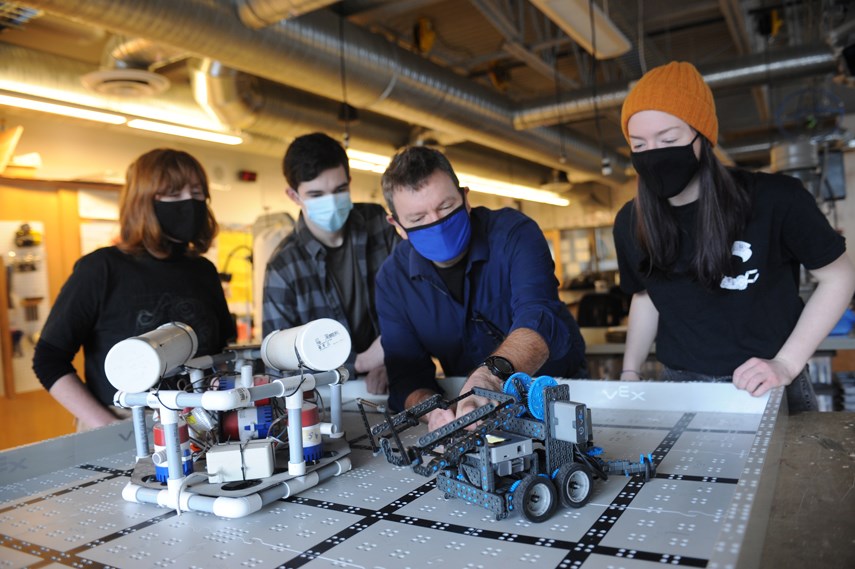
Robotics engineering teacher Rob Olson and student Pippa Crerar discuss robotics projects
at Carson Graham Secondary. Photo Mike Wakefield, North Shore News
By:
Jane Seyd,
North Shore News
For Grade 11 Carson Graham student Odette Beaudin, the hands-on part of building in robotics is a big part of its appeal.
It’s a completely different process than a lot of other academic learning, says Beaudin, 16, who has been part of the North Vancouver high school’s after-school robotics club for over a year. “You have an idea, you build and see if it works. It probably won’t work. Then you build it again,” she says. “And you just keep doing that until you get something and you learn along the way. You problem-solve in a way you don’t in your other classes.”
Beaudin says she’s always liked math and science, which led her to the engineering course offered at Carson Graham.
It’s a popular class, says technology teacher Rob Olson. “It’s challenging, but at the same time, kids can achieve there.”
The robotics club at Carson is in some ways an outgrowth of the engineering course, offering bigger hands-on challenges students can work on.
Last year the new club took part in a competition where they had eight weeks to build a robot that completed a task, competing with other teams to see whose could do that better and faster.
Cameron Janke, a 17-year-old Grade 12 student, was one of the team leaders who co-ordinated tasks on that project. Working on the electronics is another part of the process Janke has found satisfying, involving wiring signals from the controller to tiny motors, so the robots obey commands.
Now, the robotics club is hoping to take their problem-solving to the next level with the introduction of a proposed robotics academy at the school.
The academy, which is in a preliminary approval stage, plans to form a partnership with Zen Maker Labs, a local company that specializes in providing science, technology, engineering, arts and technology education to help students in both school and after-school programs in the Lower Mainland.

Robotics engineering teacher Rob Olson and student Pippa Crerar discuss robotics projects at Carson Graham Secondary. Carson is hoping to create a Robotics Academy for students. photo Mike Wakefield, North Shore News
That would also allow students to tap into connections with post-secondary institutions the lab works with, including UBC, BCIT and SFU.
Members of the lab have already been helping out with the club, says Olson, along with parents who are engineers. “And so the kids have had the ability to work with electrical engineers, mechanical engineers, and we had a material science engineer, and really give them exciting opportunities that they normally wouldn't have in a regular high school classroom.”
While a robotics academy already exists in West Vancouver School District, the new program will be a first for North Vancouver schools.
If it gets final approval, the robotics academy at Carson Graham will be open to students from anywhere in the North Vancouver school district in grades 10 through 12. Teachers hope to start with a class of between 24 and 30 students.
Startup costs for the program are estimated to be about $34,000 – most of that for specialized robotics kits. So about $10,000 has been committed and Zen Maker Labs is working on fundraising through sponsorship and donations.
The estimated cost for students to register in the academy is $2,145 per year, an amount academy organizers are hoping to bring down through sponsorships.
Robotics is “a cutting edge area to be in” for kids who are now going through high school, says Olson. “It’s kind of a new career area.”
There are a lot of different skills involved, he says, and collaborating as a team is one of the key skills students learn.
Learning from mistakes is another key skill, he says. “Often engineers will think they have the solution to a problem and they're completely wrong. And so then they have to reevaluate the problem.”
Applications for next year’s program are being accepted until Feb. 21.